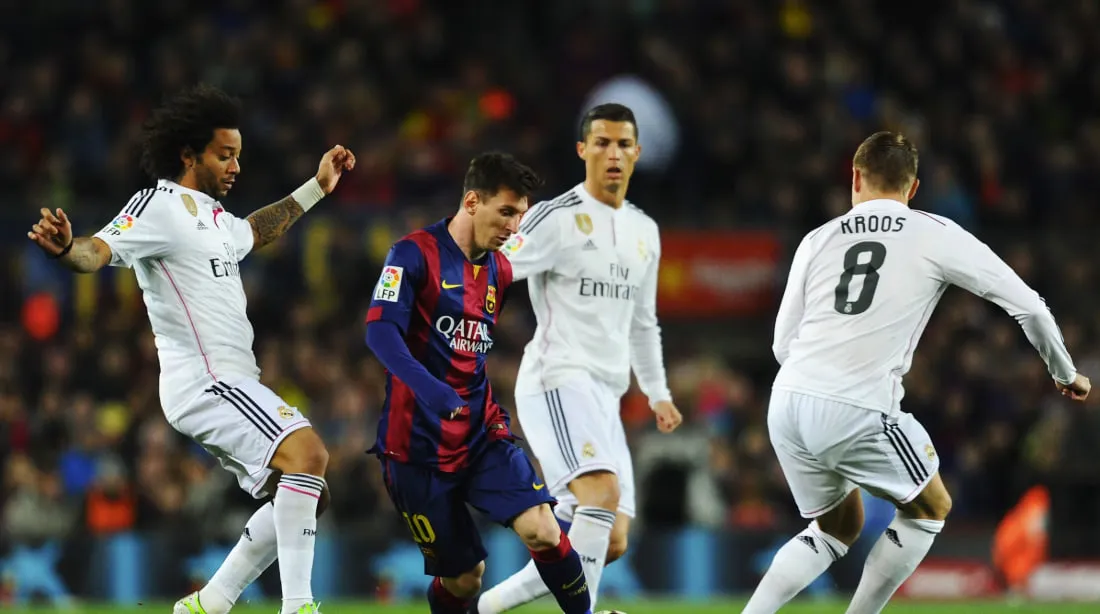In the high-stakes world of professional football, where physical prowess and technical skills are meticulously honed, one crucial aspect often remains in the shadows: the psychological dimension of performance. Paul McVeigh, a former Premier League footballer turned performance psychologist, has dedicated his post-playing career to shedding light on this overlooked area, advocating for the transformative power of mental conditioning.
Paul McVeigh competing against Cristiano Ronaldo during his playing days with Norwich City
The Psychology Gap in Modern Football
Despite increased awareness around mental health in sports, McVeigh reveals that genuine engagement with performance psychology remains surprisingly low among professional players. “While there might be more awareness now, I do not think there is more interest,” McVeigh explains in an exclusive interview with Baji Live. “Very few players actually commit to mental performance training.”
This disconnect is particularly striking given the enormous financial investments in football. McVeigh, who represented Northern Ireland and scored in the Premier League for both Tottenham Hotspur and Norwich City, has witnessed this resistance firsthand during years of presenting to players at various clubs.
“Many players had no interest whatsoever,” he recalls. “They were just ticking a box. With some, you could literally give them the winning lottery numbers and they would not be interested.” This attitude persists despite overwhelming evidence that mental fortitude often separates good players from great ones.
The Power of Visualisation
McVeigh’s journey into sports psychology began unusually early, sparked by a conversation with his golf-obsessed father when he was just 17. “My dad told me that Jack Nicklaus would always visualise where he wanted his shots to go,” McVeigh remembers. “He actually sent me a tape to learn this process of visualisation.”
This early introduction to mental conditioning proved transformative. “I started doing it when I was a kid, visualising the goals that I wanted to score every morning and every night. The majority of the goals that I did score in my 20-year career were exactly as I visualised as a kid. I massively benefited from it.”

But what exactly does effective visualisation entail? McVeigh breaks it down with precision: “It’s essentially about creating a movie in your mind that you want to happen. For example, visualise picking the ball up between the centre circle and the edge of the 18-yard box. Then, visualise pulling off to the side to receive the ball, dribbling past someone and shooting into the top corner from 25 yards out.”
The key, he emphasizes, is richness of detail. “Add more elements: think about the colors around you, the body shape of the opposition, the noise of the crowd—whatever it takes to make the whole scenario real in your own mind.”
Building Neural Pathways for Success
This process isn’t merely wishful thinking—it’s about creating neural pathways that make desired actions feel automatic. “You’re trying to become unconsciously competent,” McVeigh explains, referencing the final stage of skill acquisition where performance becomes instinctive.
He points to the common scenario of a player through on goal with only the goalkeeper to beat. “You often hear commentators say that the player had too much time. It’s because that neural pathway isn’t ingrained. They’re thinking about it rather than relying on instinct.”
This mental aspect often explains dramatic shifts in performance, such as Cole Palmer’s remarkable 28 goals in his first 37 Premier League games for Chelsea followed by an 18-game scoring drought. “One of the best players suddenly goes three months without scoring? It’s all down to state of mind,” McVeigh observes.
In contrast, he cites Mohamed Salah’s relentless consistency: “He’s not thinking whether he will score going into games, he’s thinking how many. That’s a real differential in mindset.”
Mohamed Salah’s consistent performance demonstrates elite mental preparation
Controlling the Controllables
A fundamental principle McVeigh emphasizes is focusing on what players can actually control—their own performance rather than external factors. “You cannot even control your teammate, and they’re trying to help you,” he notes wryly.
This focus becomes particularly crucial during challenging periods. “I really do think this is where players struggle when they don’t have the strategies in place. When they don’t have the experience of dealing with themselves and putting themselves in pressure situations, it can be really difficult.”
He points to former teammates like Teddy Sheringham and Sol Campbell as exemplars of continuous learning and adaptation. “Sol Campbell moved to centre-half and just kept learning to be a better and better centre-half,” McVeigh recalls admiringly.
The Evolution of Football Intelligence
While some pundits like Gary Neville have argued that modern football has become more robotic, McVeigh offers a different perspective. “You cannot be a robot because the game changes every split second and you’re constantly reacting,” he counters.
However, he acknowledges the potential information overload facing today’s players: “Now, you might have nine different coaches who all want to tell the player something. I don’t necessarily think that is helpful.”
He cites Arsène Wenger’s approach as ideal: “Wenger used to give that Arsenal team three points before a game. Psychology research tells us that the maximum amount of information that we can cope with is seven bits of information. Wenger wanted to reduce it down to three things.”
From Football to Business: Universal Applications
Now 47, McVeigh has expanded his work beyond football, bringing performance psychology principles to business leaders and organizations including Microsoft, Rolls-Royce, and KPMG. The techniques remain fundamentally the same.
“I had never spoken publicly before but I need to do it all the time in the work that I do now,” he explains. “So I started visualising stepping onto these stages.” He recently brought these insights to the Women in Sport conference in London, demonstrating the broad applicability of mental conditioning techniques.

His work with athletes continues, but with a important filter: “We don’t deliver group sessions now. We only work with players who genuinely want to improve.” This selective approach ensures that those who engage are truly committed to unlocking their mental potential.
The Mental Edge in Modern Football
As football continues to evolve at a rapid pace, with physical and technical margins becoming increasingly narrow, the psychological dimension may represent the final frontier for performance enhancement. McVeigh’s journey from Premier League player to performance psychologist offers a compelling case for why mental conditioning deserves greater attention at all levels of the game.
The evidence from his work with players like Jacob Murphy, Aaron Wan-Bissaka, and Tyrick Mitchell—all now established Premier League performers—suggests that those willing to embrace mental conditioning can gain a significant competitive advantage.
For fans watching the increased Premier League coverage, understanding this psychological dimension adds a fascinating layer to appreciating player performance and those moments when the mental game proves decisive.
Have you noticed how mental strength affects player performance? Which players do you think demonstrate exceptional psychological resilience? Share your thoughts and join the conversation below.

